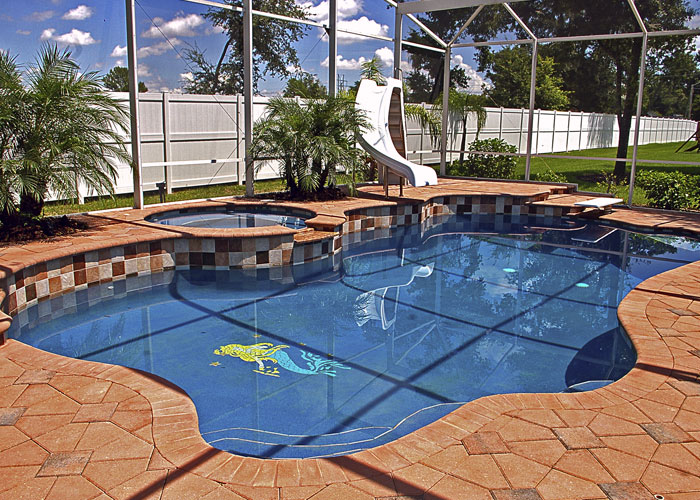Salt water pools have rapidly gained in popularity around the United States over the last decade. Today, about 75% of all new pools in Las Vegas are salt water pools. A salt water pool may seem like the clear choice because it puts an end to harsh chemicals, careful chemical monitoring, and the harsh effects of chlorine but there are trade-offs.
As one of the leading pool cleaning companies in Las Vegas, we want you to be aware of the challenges you may face if you choose a salt water pool.
Salt Can Be Corrosive and Damaging
Salt water pools are often touted as being softer and more enjoyable without the harsh aroma of chlorine. While this can definitely be true, salt is also corrosive and can cause damage to pool equipment and even your pool deck. Surfaces like light covers, metal ladders, copper heating elements, and pool pumps can all be susceptible to discoloration, pitting, and corrosion. Salt water can also be damaging to concrete, natural stone, and brick pool decks and patios.
Pool deck damage from salt water splash-out is more common in hot, dry areas like Las Vegas where rain is too infrequent to dilute and wash away salt. When salt gets into concrete crevices and softer stones, evaporation recrystallizes the salt and puts pressure on the material. Eventually, even concrete will begin to develop pits and degrade.
Scale Can Be a Big Problem
All swimming pool owners will deal with scale; it’s just a normal part of hard water and evaporation. Salt water pools, however, are more prone to serious scale problems. Scale is simply a deposit of minerals, especially calcium, left behind on the surfaces of your pool. Without regular swimming pool cleaning, scale deposits will become thicker, more unsightly, and harder to remove. Unlike regular pools, which usually develop a white scale deposit at the waterline of the pool, salt water pools can develop a more pervasive scale problem that can make the entire surface of the pool feel very rough.
Unlike most substances, calcium tends to drop out of water and form deposits faster and easier the hotter the water becomes. Salt water pools use an ECG, or electrolytic chlorine generator, which uses electricity to dissolve salt to produce chlorine for the pool water. The ECG creates the ideal conditions for scale development because it’s hot and has a chemical environment with a high pH. Without careful monitoring, your pool water will increase in pH which leads to scale in the entire pool. The ECG itself is also prone to scale build-up on the blades which slough off and shorten the life of the unit.
One of the biggest contributors to scale in a salt water pool is the salt itself, which contains inorganic and organic contaminants. To battle scale, you’ll need to take several steps in your swimming pool maintenance:
— Use mechanically evaporated salt which has fewer contaminants than mined rock and solar salt.
— Use treatment products specifically for a salt water pool. Products for regular pools have phosphorus-based chemicals and sulfates that contribute to the scale problem in the ECG.
— Test the water regularly to maintain the correct pH.
— Schedule regular pool cleaning. Pool water cleaning is important for removing contaminants and scale but your pool tile will also need to be cleaned regularly to remove scale. Your ECG will also need regular cleaning and maintenance to keep it functioning properly.
